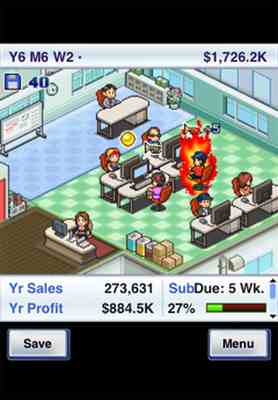- MENU
- HOME
- SEARCH
- WORLD
- MAIN
- AFRICA
- ASIA
- BALKANS
- EUROPE
- LATIN AMERICA
- MIDDLE EAST
- United Kingdom
- United States
- Argentina
- Australia
- Austria
- Benelux
- Brazil
- Canada
- China
- France
- Germany
- Greece
- Hungary
- India
- Indonesia
- Ireland
- Israel
- Italy
- Japan
- Korea
- Mexico
- New Zealand
- Pakistan
- Philippines
- Poland
- Russia
- South Africa
- Spain
- Taiwan
- Turkey
- USA
- BUSINESS
- WEALTH
- STOCKS
- TECH
- HEALTH
- LIFESTYLE
- ENTERTAINMENT
- SPORTS
- RSS
- iHaveNet.com: Video Games

There's definitely some sort of trippy meta-layer to being a game developer who develops a game about game development, but Kairosoft has pulled it off well with "Game Dev. Story" on the iPhone and iPod
There's definitely some sort of trippy meta-layer to being a game developer who develops a game about game development, but Kairosoft has pulled it off well with "Game Dev. Story" for the iPhone and iPod Touch.
In this mobile sim RPG made for the video game industry enthusiast, you'll have the choice to develop for systems as they are released, with derivative names like Intendro IES and Game Kid, and the Senga Exodus and Play Gear. You'll hire a staff (and pay their salaries), level up their skills and take outside contracts to make more money. These contracts range from working on ringtones (which utilizes your sound production skills) to designing a pinball machine video or mascot costume (using your graphics skills).
Your focus is game development, of course. You buy a license to develop on the systems you choose, and pick the genre of game and type of characters, each of which has a popularity rating and a development cost attached. If the final sum fits within your budget and you're comfortable spending the amount, you can start development.
Game development begins by choosing someone on your staff or hiring an outside contractor to write the scenario proposal. During development the game will progress through the alpha and beta versions, and at these points you have to choose someone to work on the graphics and sound, the outcome depending on the skill level of the person doing the work.
Contracts and games are worked on automatically, as your staff sits at their computers, getting up to walk around or help each other, with symbols for graphics, creativity, sound and fun popping up over their heads. They go home and come back as weeks tick by. When they reach the required numbers, the work will be complete and your company will either be paid by the hiring company or the game will become ready for release. You can also purchase ads in media such as radio, magazines and TV, or even release a demo to build hype and fame and gain fans. Timing all this with your release is key. After the release, you can choose to take a new contract or work on a new game. Your sales are tallied until your last game is taken off the market.
As your company progresses, it will generate fan letters praising or denouncing the quality of your games, receive invitations to the Global Game Awards, get the opportunity to rent a booth at the Gamedex trade show (booth babes or animal costumes cost more), and be mentioned in magazines, all of which will boost your company's standing around the world.
For example, here is a description of my personal scenario:
Nearly six years after startup
"Game Dev. Story" is clearly meant for people who are involved with or fans of the video game industry. It spares no jokes, no matter how obvious a parallel -- characters have names such as Dee Coder, Newb Ownerton, John Gameson, Sigeto Minamoto, and Ann Deroid,. The graphics look very much like something you'd see on in old PC or Apple game (yes, even before they were called Macs), and the sound is made up of jovial digitized bit music that is fun at first but can become annoying in long bursts.
Still, there's something addictive about the game. With each contract and each game made, I found myself wanting to see what would happen. Weeks and years passed quickly in "Game Dev. Story" while mere hours passed in the real world, and before I knew it I had created a slew of games and was able to track their stats and continue to make better ones by leveling up genres I'd already worked on. New systems continued to be unveiled and the money kept coming in. I was on a quest to see whether my next project would be bigger and more popular than the last, on a financial roll only suspended when I ran out of time to play.
At its launch price of
Available at Amazon.com:
Article: Copyright © iHaveNet
Video Games: 'Game Dev. Story'
Article: Copyright © Tribune Media Services